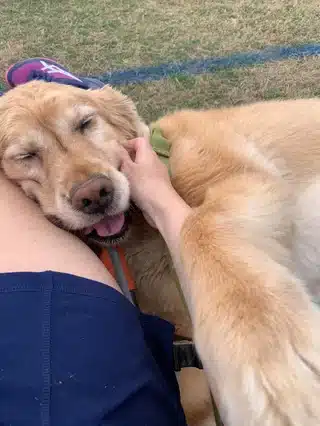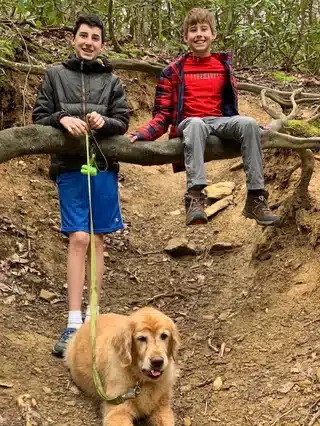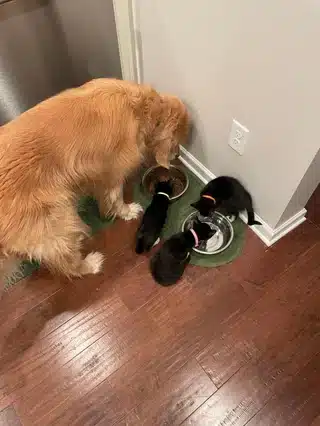Lessons in Grief
We had to put our family dog, Nana, down this summer. She was ten and had blood cancer.
My older son has mild autism, and when he was young and newly diagnosed, we explored getting a service dog for him. Golden Retrievers are the go-to breed for service dogs for people with autism. While Kevin’s autism wasn’t severe enough to qualify us for financial support to get a service dog, and we couldn’t afford the expense of a formally trained service dog on our own, we decided the best solution was to get a “regular” Golden Retriever and at least reap the benefits that made the breed the ideal autism service dog.
I don’t know what service dog abilities we expected exactly, but I’m confident we didn’t get them. Not even close! What we ended up with was an ordinary family dog with her own quirks and preferences in life. She and Kevin formed a bond for sure, but she didn’t perform any special tasks or have any qualities that helped him manage his autism.
Last night I was talking to the boys about what they miss most about Nana. Kevin talked about how she would bark and howl and run in her dreams, lying on the floor sideways, legs pumping and able to be heard throughout the house. (“What’s that noise? Oh, just Nana dreaming again. Let her sleep. Sounds like she’s going to catch whatever it is this time.”) Ben talked about how she chased her tail regularly, zooming around in circles in the family room. I’m not sure she ever figured out that was her own darn tail! I miss having my walking buddy and her following me around the house no matter what I was doing.



Truth be told, she was a terrible “service” dog. But that’s not what her value was to us. That’s not how we judged her worth. We loved her for incessantly begging at the dinner table and kitchen counter, licking dirty dishes in the dishwasher, for pooping at least three times on every walk. We thought it was hysterical how much she loved men – all men. Frisky girl! How she tolerated the foster kittens I paraded through the house when they climbed on her and swatted her nose or tail.
We are grieving as we all do when a pet passes on. We’re not grieving because of what she did or did not provide to us in terms of productivity or service. We’re grieving who she was and how her way of being in the world brought us joy and added to our lives. It’s quieter now, and there is a giant hole where she was.
If you think about it, we afford this same grace to babies. We love them for who they are, not what they can do. But frighteningly quickly, we start to expect children to behave a certain way, accomplish certain things. Cooperate and behave, do what you’re told, get good grades. And that only intensifies in adulthood – be productive, achieve goals, climb the ladder. Contribute.
Why do we allow ourselves to adopt this mindset about ourselves and others? So many coaching clients at The Sparks Group fret about their lack of worthiness because they haven’t achieved a goal, or a promotion, or “made it” – whatever that means to them in their context. How do we lose sight of our inherent value and the gifts we give just by being who we are with those around us?
David Brooks writes eloquently about the distinction between resume virtues and eulogy virtues.
“It occurred to me that there were two sets of virtues, the résumé virtues and the eulogy virtues. The résumé virtues are the skills you bring to the marketplace. The eulogy virtues are the ones that are talked about at your funeral — whether you were kind, brave, honest or faithful. Were you capable of deep love?
We all know that the eulogy virtues are more important than the résumé ones. But our culture and our educational systems spend more time teaching the skills and strategies you need for career success than the qualities you need to radiate that sort of inner light. Many of us are clearer on how to build an external career than on how to build inner character.”
In my more painful and denial-oriented moments of grief, I have wondered why anyone gets a dog when it’s going to hurt this much when they die. But I wouldn’t trade a moment of the last ten years with her even though it really stinks right now.
As Winnie the Pooh said and my partner Jay reminds me, “how lucky I am to have something that makes saying goodbye so hard.”
My hope is that we can all live like Nana – unabashedly ourselves, knowing we are loved for who we are, not what we can do.
Jessica
Founder & CEO
The Sparks Group

